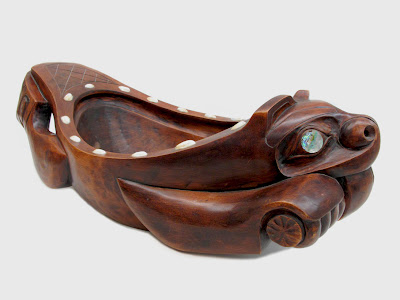Potlatch Bowl, c. 1985
Don Lelooska Smith (1933-1996); Cherokee/Kwakiutl Culture
Wood, shell and mother-of-peral; 9 x 12 x 23 1/2 in.
86.51.1
Gift of Mr. and Mrs. Charles D. Aberle
This potlatch bowl was made by Don “Lelooska” Smith (1933-1996) a Native American carver of Cherokee and European ancestry. Lelooska’s Kwakiutl (Kwakwaka’wakw) style carvings, and costumed performances, brought the sculptor attention throughout the 1960s and 1970s. This particular bowl is carved in the antique style and represents a sea otter. The bowl is made of stained brown cedar with abalone shell inlaid eyes and embedded cowrie shells around the bowl. A potlatch bowl is a personal food dish used during potlatch ceremony. Most are zoomorphic in form as well as mythically significant and symbolic of one’s status.
Potlatch has been practiced for thousands of years by some indigenous peoples on the Pacific North West. A potlatch ceremony usually celebrates a significant event in a family such as a birth, rite of passage, wedding, funeral or the honoring of the dead. The potlatch host’s wealth is measured by the giving away of food and gifts gathered for the event. Potlatch invitees could be made up of local guests or of a more elite group of guests from many tribes from different areas. In the past, most ceremonies occurred inside a large longhouse and lasted several days. Speeches, feasting and gift-giving occurred as did singing and dancing. Masks and headdresses depicting supernatural beings were performed. Overall the event was a demonstration of the host’s generosity and wealth.
Today potlatches still occur but, with adjustments for modern times. Cultural significance of the ceremony remains in place and gift giving patterns are reminiscent of the earlier periods of the ceremony. A family must plan for months and thousands of dollars are saved to host the hundreds of invited guests who receive food, gifts such as household necessities and money. Instead of lasting several days, potlatches are usually limited to the weekend to accommodate work schedules.
All images and text under copyright. Please contact Collection Department for permission to use. Information subject to change with further research.


Comments